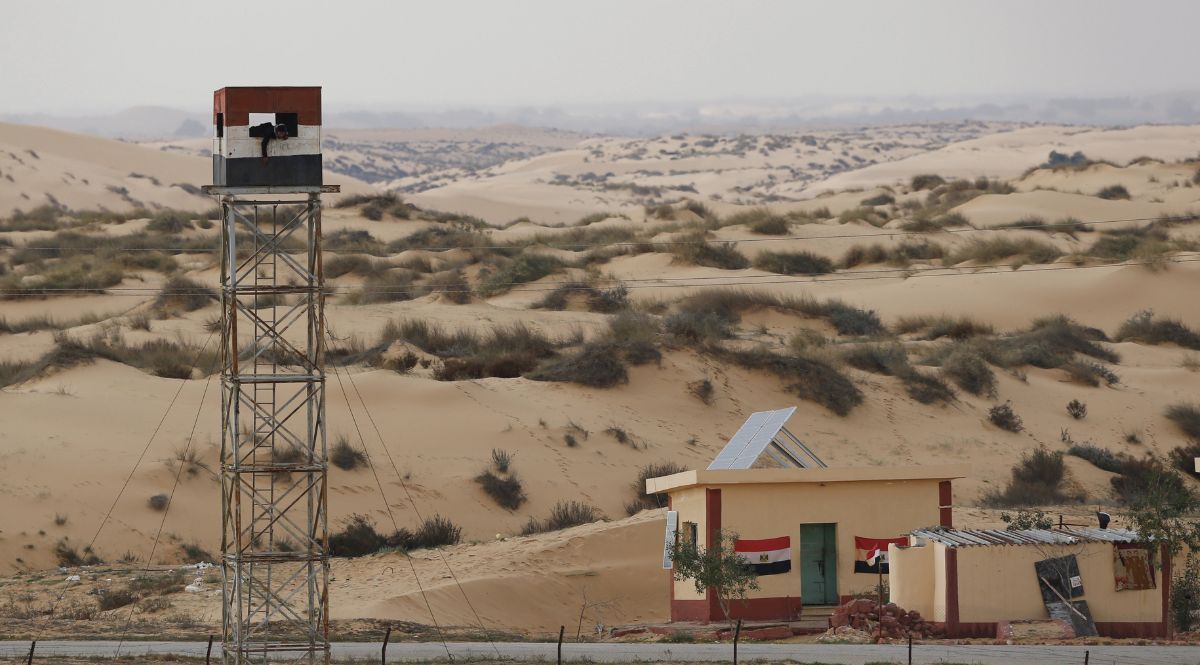Egypt on Twinned Mission to Secure Sinai and Halt the Gaza War
Stabilising the security of the Sinai Peninsula has been one of the main goals of the Egyptian authorities in recent years and it has contributed to the Egyptian military’s cooperation with Hamas to combat jihadists, including ISIS. Concerns about the return of instability to Sinai is affecting Egypt’s policy and priority of negotiating a ceasefire in Israel’s war against Hamas. It would allow the country to benefit politically and economically from the rebuilding of the Gaza Strip and preclude the risk of Sinai destabilisation.
 Amir Cohen / Reuters / Forum
Amir Cohen / Reuters / Forum
Situation in Sinai in Recent Years
A purported rebellion in Sinai, which has been ongoing since 2011, is now characterised by low intensity, isolated attacks, mainly against Egyptian security forces. The difficulty of eradicating the still-active jihadist cells on the peninsula is linked to the long-standing marginalisation of the local population, its location on the border between Egypt and Gaza, enabling smuggling, and human rights violations by Egyptian security services. Their presence in Sinai increased in response to the intensification of jihadist attacks in 2011, especially after Abd al-Fattah al-Sisi's 2013 coup and the announcement of a military operation on the peninsula. However, the planned campaign, which lasted several weeks, was not successful, forcing a multi-year commitment by the army to Sinai. During the height of the conflict between 2013 and 2018, more than 12,000 residents were arrested. Many, including minors, were wrongfully detained, tortured, and unlawfully executed. Despite this, members of groups operating in the Sinai in 2014 managed to unite with ISIS fighters, allowing them to intensify their activities as an affiliate of ISIS Sinai Province (ISIS-SP). Egypt’s actions were supported by Israel, which accepted the presence of Egyptian forces beyond the provisions of the peace treaty, which stipulates the demilitarisation of Sinai, and directly attacking ISIS-SP targets.
At the same time, the army increased recruitment of local Bedouin and clan leaders. In 2015, the Union of Sinai Tribes was formed. It is a paramilitary organisation cooperating with the Egyptian army, whose fighters came mainly from the Tarabin tribe. Its involvement, though also characterised by serious human rights violations, has helped reduce jihadist activity. The number of ISIS-SP members fell from about 1,300 in 2018 to about 500 in 2023. Union founder Ibrahim al-Organi was a smuggler who was imprisoned for two years before its formation. After his release, he began working with the military and the president’s son (and deputy head of intelligence) Mahmoud al-Sisi. His support allowed him to develop the Organi Group, which became an important partner in military investments in the construction, transportation, and agricultural industries in Sinai.
The Sinai community, however, has a negative attitude toward the army, as evidenced by the ongoing social tensions. Last October, hundreds of North Sinai residents demonstrated, demanding the right to return to their homes. Between 2013 and 2018, the army destroyed about 7,400 buildings. During the operation against the terrorists, nearly 150,000 people were evacuated and assured that they could return once the construction of new settlements was completed, which was supposed to happen by last August. The failure to fulfil this commitment and the Defence Ministry’s takeover of the Sinai Development Agency, which exacerbated the lack of civilian control over development work in the region, increased the population’s fears that the settlements under construction would end up in commercial circulation, due to the military’s significant role in the state’s economy, or to Palestinian refugees potentially displaced from the Gaza Strip.
Sinai and the Gaza Strip
After the 2013 military coup, Egyptian authorities maintained limited and antagonistic relations with Hamas due to its ties to the Muslim Brotherhood, considered by President al-Sisi as a major political enemy. Relations improved in 2017 after cooperation was established to combat ISIS and other jihadist organisations in Sinai and Gaza, as they also posed an ideological threat to Hamas. The rapprochement benefited local groups affiliated with the military and companies led by Organi that coordinate movement on the border and operate, for example, in the construction and commercial sectors in Gaza. This cooperation also has resulted in recent years in weakening the fight against smuggling on the Egyptian-Palestinian border, where there is a network of cross-border tunnels. The Hamas arsenal revealed by the 7 October attack and in the fighting with the Israeli army in the Gaza Strip testified to the serious scale of the transfer of armaments through smuggling routes from Sinai—a practice ignored by the Egyptian security services that involved local Bedouin tribes. It wasn’t until the Israeli military revealed the scale of the network of tunnels on the border between the Gaza Strip and Egypt that its authorities pledged to increase border controls and build structures to prevent more tunnels.
Since the beginning of the Gaza war, one of biggest concerns for Egypt, which also plays the role of mediator between Israel and Hamas, has been the deepening instability in Sinai caused by the potential exodus of the Palestinian population. For this reason, Egypt has firmly rejected suggestions by members of the Israeli government to resettle Gaza residents in Sinai. Sinai residents who themselves lost their homes during the anti-terror operations, also protested the move. Egypt’s concerns about maintaining control of Sinai increased with the start of the Israeli military’s offensive in the border area (the so-called Philadelphia Corridor) in May this year, and its assumption of control of the Rafah crossing. In response, Egypt halted the transfer of humanitarian aid across the border, making its resumption contingent on the restoration of control on the Palestinian side of the corridor by local authorities. On the one hand, due to Egyptian and Arab public hostility toward Israel, Egypt did not want to coordinate border traffic with Israel and be seen as complicit in the humanitarian disaster in Gaza. On the other hand, it wants to pressure Israel to accept a ceasefire proposal, which remains a priority for Egypt, a country also suffering economic losses related to the war. Indeed, the war has contributed to the Egyptian pound’s decline, reduced tourism in Sinai, and cut the income from Suez Canal shipping caused by Houthi attacks on ships off the Horn of Africa. At the same time, Egypt hopes that a ceasefire will allow reconstruction of the Gaza Strip to begin, with companies affiliated with the Egyptian army taking part.
Conclusions and Outlook
Given the continued control of the border by Israeli and Egyptian forces, the risk of a mass exodus or forced displacement of the Palestinian population into the Sinai remains low at present. Israel’s assumption of control over the Philadelphia Corridor and the presence of its troops on the border are seen as a risk factor and part of an Israeli fait accompli policy aimed at legitimising long-term military control over the Gaza Strip, which is contrary to Egyptian interests. The Israeli side, in turn, may accuse Egypt of having too friendly policy towards Hamas in the run-up to the war and that it may have served to strengthen the organisation militarily. At the same time, the situation on the Sinai Peninsula underscores the mutual dependence in the security sphere, which will mitigate any crises in relations.
The Egyptian authorities will use their relations with all interested parties—including Hamas—to maintain internal stability in Sinai. Their role as a mediator between Israel and Hamas remains unchallenged, and the priority is to achieve a ceasefire as soon as possible and turn it into a lasting peace. In addition to security issues, the prospects of rebuilding economic losses, for example, after the reduction of Houthi attacks and the return of tourism to Egypt, also are important.
Expanding humanitarian aid and joining the stabilisation and reconstruction efforts in the Gaza Strip require participation and coordination with Egypt and an increasing international community commitment to Sinai. To improve the operation of the Rafah border crossing, EU countries could reactivate and expand the mandate of the EU Border Assistance Mission. Another step, however one that would require a broader multilateral agreement, would be to change the format of the Multinational Force and Observers mission stationed in Sinai (a mission operating under the Israeli-Egyptian peace treaty). In the context of Gaza reconstruction, the EU could push for the greatest possible transparency and participation of external actors to avoid the capture of funds by groups linked to the Egyptian military. It should also take into greater account the state of the human rights regime in Sinai in its diplomatic dialogue with Egypt.





.jpg)
.png)